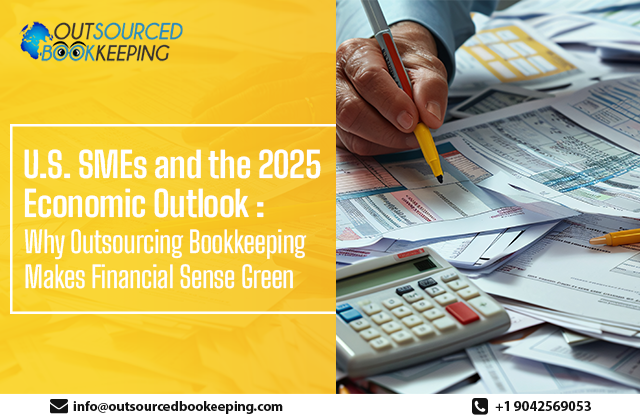The business landscape is evolving rapidly, and the market is becoming increasingly competitive. Consequently, staying relevant and making smarter financial decisions requires more than just resilience; it requires more effective financial strategies. This article explores how outsourcing bookkeeping services can be a game changer for your business, especially in light of the 2025 small business financial trends.

2025 U.S. Economic Landscape for SMEs
There is always room for growth, with potential all around. However, as always, there are hurdles to overcome. For SMEs, some of these hurdles include:
- Rising Operational Costs: Due to global inflation, the prices of goods, wages, and services are rising. As a result, SMEs may have to contend with smaller profit margins.
- Evolving Tax Regulation: Laws and regulations constantly change, and tax regulations for 2025 are no exception. The aim is to close gaps and ensure compliance. However, complexities will emerge, which may serve as a concern for SMEs lacking robust financial expertise.
Problem with In-House Bookkeeping
Managing your finances or books in-house may seem like the logical thing to do as a small and medium enterprise, but it can be more challenging than you would imagine.
High Costs: Hiring and retaining an in-house bookkeeper involves paying a fixed salary, but it is more than just paying salaries. You would have to cover benefits and training. These expenses will quickly add up and strain already tight budgets.
Limited Expertise: Tax codes are complex and change frequently. Unless your in-house team regularly attends training sessions, they may not be up to date with the current regulations.
Time-Consuming: Small business owners value time. The hours spent reconciling accounts, preparing financial reports, and ensuring tax compliance could have been used to grow the business.
Operational Inefficiencies: When it comes to calculations, human error is inevitable, and manual bookkeeping can result in mistakes. An omission here, a wrong figure there, and financial discrepancies would result. This is why the use of technological tools is welcomed.
The Green Advantage of Outsourcing Bookkeeping
Where we are right now with increasing environmental awareness, businesses are being greatly scrutinised for adopting sustainable practices. For small and medium-sized enterprises, balancing their profits with ecological responsibility may be a daunting task.
However, it is easier than imagined. Outsourcing bookkeeping is a practical way to reduce environmental impact whilst still improving efficiency and saving costs. These are some of the the green benefits of outsourced bookkeeping 2025
Reduce Paper waste
Conventional bookkeeping relies on physical records. There are huge stacks of invoices, receipts, and financial records, all of which require tons of paper. Eventually, these contribute to landfill waste. Outsourced bookkeeping helps the transition to digital and paperless systems. These service providers use cloud-based platforms to store and manage records, which eliminates the long paper trail.
According to the Environmental Protection Agency (EPA), paper and paper products accounted for 23.7% of total municipal waste generated in the United States in 2018. Based on global statistics from the World Bank, paper waste is a huge part of the waste generated by world cities each year and is said to increase by 70% by the end of 2050 if drastic measures aren’t taken. It is beneficial to the business because less paper means less printing, storage, and disposal expenses.
Lower Energy Consumption
Running a standard in-house bookkeeping operation requires office space, equipment, and energy-intensive processes. All the equipment consumes electricity and contributes to the overall carbon footprint. Outsourced bookkeeping providers operate remotely most of the time and use advanced cloud-based tools.
It is beneficial to the business because reduced consumption equals lower utility bills.
Long-Term Environmental Impact
The ripple effects of sustainability goals are significant over time. According to the World Wildlife Fund (WWF), about 30% of the world’s forest loss can directly or indirectly be attributed to paper production.
Choosing outsourced bookkeeping eventually leads to reduced deforestation because it helps lower the paper demand, which in turn preserves the forests. By reducing the amount of energy used and waste, SMEs contribute to lower pollution, which benefits the ecosystem.
Final Overview
Incorporating sustainability into business practices is not as daunting as it might seem, as it does not require any big changes. Outsourcing bookkeeping for SMEs helps contribute to environmental goals, boosts efficiency, and saves costs. It is a win-win situation for SMEs because it supports business growth, improves efficiency, and still shows that the planet is a priority.



